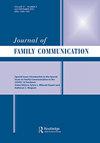Birth Mothers’ Experiences of Privacy Turbulence in Relation to Closed Adoption Information
IF 1.8
Q2 COMMUNICATION
引用次数: 6
Abstract
ABSTRACT Adoption information, including original birth certificates (OBCs) and (non)identifying information, is kept secret from birth mothers who place their children in closed adoptions. Through the lens of communication privacy management theory (CPM), the present student explores how birth mothers who participated in closed adoptions experienced turbulence related to wanting to still be included in the privacy boundary of their children in a range of ways that were inconsistent with the legal parameters of a closed adoption. Participants (n = 31) responded to an online questionnaire asking about privacy issues and expectations related to their adoption information, specifically their experiences of turbulence. Emergent themes included inaccurate notions about perceived shared co-ownership rights, regret about the limited primary control of adoption information, and a desire for turbulence, allowing further expansion of co-ownership and control. Results of this study show how birth mothers who have engaged in closed adoptions may come to regret signing over control of their children (and consequently all privacy management decisions) to adoption agencies. These women appreciate the cultural and legal shifts that have created turbulence, opening up adoption records in some states, enabling them to potentially co-own more information about their children. Implications of these findings demonstrate birth mothers’ privacy rules evolve over time.生母对封闭式收养信息的隐私动荡体验
摘要收养信息,包括原始出生证明(OBC)和(非)身份信息,对将孩子封闭收养的生母保密。通过沟通隐私管理理论(CPM)的视角,本学生探讨了参与封闭式收养的生母是如何经历动荡的,这些动荡与希望仍然以一系列不符合封闭式收养法律参数的方式被纳入孩子的隐私边界有关。参与者(n=31)回答了一份在线问卷,询问与收养信息相关的隐私问题和期望,特别是他们的动荡经历。新出现的主题包括对感知的共同所有权的不准确概念,对收养信息的主要控制有限的遗憾,以及对动荡的渴望,从而允许共同所有权和控制权的进一步扩大。这项研究的结果表明,参与封闭收养的生母可能会后悔将对孩子的控制权(以及所有隐私管理决定)移交给收养机构。这些女性欣赏造成动荡的文化和法律转变,在一些州打开了收养记录,使她们有可能共同拥有更多关于孩子的信息。这些发现表明,生母的隐私规则会随着时间的推移而演变。
本文章由计算机程序翻译,如有差异,请以英文原文为准。
求助全文
约1分钟内获得全文
求助全文

 求助内容:
求助内容: 应助结果提醒方式:
应助结果提醒方式:


